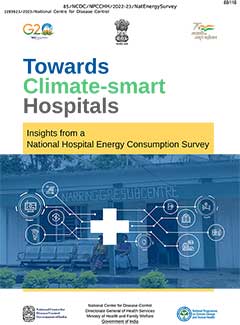Research
Climate Change and Human Health
Mapping Energy Footprint of Indian Health Care System – The National Hospital Energy Consumption Survey
The National Hospital Energy Consumption Survey was conceptualized and conducted by the National Centre for Disease Control, Directorate General of Health Services, Ministry of Health and Family Welfare, Government of India under the aegis of the National Programme on Climate Change and Human Health (NPCCHH), with technical support from Alliance for an Energy Efficient Economy and Centre for Chronic Disease Control.
This report displays the potential to establish a preliminary understanding of Indian health sector’s energy consumption from both, a quantitative and qualitative perspective. It provides a first look at the energy footprint of the Indian health sector. Its results are based on the detailed survey of 600+ public and private hospitals of 10 typologies across 18 States/UTs and all 5 climate zones of India that it covered.
These findings provide insights that can be leveraged to strengthen public health care infrastructure, build climate resilience, enabling health care workforce and transitioning to renewable energy. Additionally, the findings on end-use interventions at all levels of healthcare provide a basis for further amplifying efforts in public and private hospitals. The key recommendations are as following:
- Track energy consumption in all healthcare facilities for managing energy cost and related emissions in hospitals
- Enhance energy efficiency in hospitals through Energy Service Companies (ESCOs)
- Mandate Energy Conservation Building Code (ECBC) norms for new construction and major renovation
- Mandate energy efficiency as an evaluation criterion in hospitals’ procurement policies for purchasing medical devices, appliances, and equipment
- Disclose and benchmark data for energy performance target setting
- Create an integrated approach to state-level energy transition (including energy efficiency and renewable energy) in hospitals
- Increase renewable energy deployment in public healthcare infrastructure through state government-led initiatives
- Ensure effective operations and maintenance of renewable energy systems
- Enhance awareness and build capacities of health sector actors for efficient and clean energy transition
- Leverage funding through global, national, and state-level funding mechanisms

